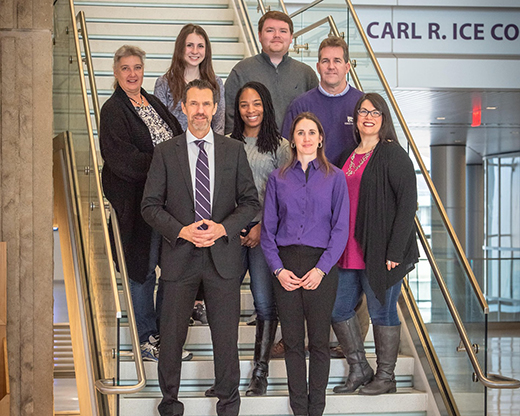K-State Center for Hazardous Substance Research to receive $5 million in continued EPA funding
Monday, April 26, 2021

This January 2020 file photo shows members of the K-State Technical Assistance to Brownfields program, which has been selected to receive $5 million in EPA funding for continued assistance with reuse and redevelopment of brownfields. The program includes, counterclockwise from front left, Blase Leven, TAB program director; Daena Blair; Maggie Egbarts; Jennifer Clancey; Scott Nightingale; Zach Etzel and Cait Riordan, student interns; and Sheree Walsh.
MANHATTAN — The U.S. Environmental Protection Agency has selected the Kansas State University Center for Hazardous Substance Research to receive a $5 million grant to continue brownfield revitalization work.
K-State is one of six organizations nationwide that will receive a total of $11 million in grants to help communities across the country under the Technical Assistance to Brownfields, or TAB, program. The Center for Hazardous Substance Research will use the funding to continue the K-State TAB program. K-State will provide training and technical assistance in EPA regions 5, 6, 7 and 8, and lead nationwide efforts with the five other organizations.
"We are privileged and honored to be selected to continue serving communities and tribes across EPA regions 5, 6, 7 and 8," said Blase Leven, director of the Center for Hazardous Substance Research and director of the K-State TAB program. "This area is like none other, and we look forward to making new friends and working with old ones to bring brownfield revitalization dreams to life."
A brownfield site is real property where expansion, redevelopment or reuse may be complicated by the presence or potential presence of a hazardous substance, pollutant or contaminant. EPA's Brownfields Program empowers states, tribes, communities and other stakeholders to work together to prevent, assess, and safely clean up and sustainably reuse brownfields.
The TAB program funds organizations such as K-State that work with a large team and network of partner organizations to provide technical assistance to communities and other stakeholders. It helps them tackle the challenge of assessing, cleaning up and preparing brownfields sites for redevelopment, especially in underserved, rural, small and distressed communities.
A part of the Carl R. Ice College of Engineering, the Center for Hazardous Substance Research conducts research, education and service pertaining to environmental topics. Through this center, K-State provides TAB assistance to communities as an independent resource and helps them with community involvement, better understanding health impacts of brownfield sites, site preparation activities, brownfield finance questions and information on integrated approaches to brownfield cleanup and redevelopment.
